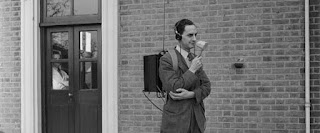 |
| The first British Broadcasting Corporation Logo |
More information: BBC
The Grandma starts today a new online course to learn English using 2.0 tools. Her last families got A2 and B1 Cambridge Exams. The Grandma has decided to start reviewing B1 level in an attempt to help A2 relatives to improve their English to reach B1 level, and B1 relatives to consolidate their level to continue studying to reach the next B2 level.
The British Broadcasting Corporation (BBC) is a British public service broadcaster. Its headquarters are at Broadcasting House in Westminster, London and it is the world's oldest national broadcasting organisation and the largest broadcaster in the world by number of employees.
 |
| BBC Outside Broadcast Equipment, 1951 |
The fee is set by the British Government, agreed by Parliament, and used to fund the BBC's radio, TV, and online services covering the nations and regions of the UK. Since 1 April 2014, it has also funded the BBC World Service, launched in 1932 as the BBC Empire Service, which broadcasts in 28 languages and provides comprehensive TV, radio, and online services in Arabic and Persian.
More information: BBC
Around a quarter of BBC revenues come from its commercial arm BBC Studios Ltd, formerly BBC Worldwide, which sells BBC programmes and services internationally and also distributes the BBC's international 24-hour English-language news services BBC World News, and from BBC.com, provided by BBC Global News Ltd.
 |
| BBC Mobile Unit |
Britain's first live public broadcast from the Marconi factory in Chelmsford took place in June 1920. It was sponsored by the Daily Mail's Lord Northcliffe and featured the famous Australian soprano Dame Nellie Melba. The Melba broadcast caught the people's imagination and marked a turning point in the British public's attitude to radio.
More information: BBC
However, this public enthusiasm was not shared in official circles where such broadcasts were held to interfere with important military and civil communications. By late 1920, pressure from these quarters and uneasiness among the staff of the licensing authority, the General Post Office (GPO), was sufficient to lead to a ban on further Chelmsford broadcasts.
But by 1922, the GPO had received nearly 100 broadcast licence requests and moved to rescind its ban in the wake of a petition by 63 wireless societies with over 3,000 members.
 |
| George Orwell |
The British Broadcasting Corporation came into existence on 1 January 1927, and Reith, newly knighted, was appointed its first Director General. To represent its purpose and stated values, the new corporation adopted the coat of arms, including the motto Nation shall speak peace unto Nation.
More information: BBC
Television broadcasting was suspended from 1 September 1939 to 7 June 1946, during the Second World War, and it was left to BBC Radio broadcasters such as Reginald Foort to keep the nation's spirits up.
 |
| Charles de Gaulle in BBC editorial |
More information: BBC
During his role as Prime Minister during the Second World War, Winston Churchill would deliver 33 major wartime speeches by radio, all of which were carried by the BBC within the UK.
On 18 June 1940, French general Charles de Gaulle, in exile in London as the leader of the Free French, made a speech, broadcast by the BBC, urging the French people not to capitulate to the Nazis.
More information: The Guardian
There was a widely reported urban myth that, upon resumption of the BBC television service after the war, announcer Leslie Mitchell started by saying, As I was saying before we were so rudely interrupted...
In fact, the first person to appear when transmission resumed was Jasmine Bligh and the words said were Good afternoon, everybody. How are you? Do you remember me, Jasmine Bligh...?
 |
| Jasmine Bligh |
Competition to the BBC was introduced in 1955, with the commercial and independently operated television network of ITV. However, the BBC monopoly on radio services would persist until 8 October 1973 when under the control of the newly renamed Independent Broadcasting Authority (IBA), the UK's first Independent local radio station, LBC came on-air in the London area.
As a result of the Pilkington Committee report of 1962, in which the BBC was praised for the quality and range of its output, and ITV was very heavily criticised for not providing enough quality programming, the decision was taken to award the BBC a second television channel, BBC2.
In 2002, several television and radio channels were reorganised. In 2008, another channel was launched, BBC Alba, a Scottish Gaelic service. Unlike the other departments of the BBC, the BBC World Service was funded by the Foreign and Commonwealth Office, the British government department responsible for promoting the interests of the United Kingdom abroad.
More information: History Extra
I believe that the BBC, in spite of the stupidity of its foreign propaganda and the unbearable voices of its announcers, is very truthful.
It is generally regarded here as more reliable than the press.
If liberty means anything at all, it means the right to tell people what they do not want to hear.
If liberty means anything at all, it means the right to tell people what they do not want to hear.
George Orwell
Your article is very interesting. And you have decorated your art beautifully. It inspires people a lot. If the subject is good, then it is also fun to read and this is what people want nowadays, your post is really interesting. Inspired by you, I too think I should write an article on a fun subject.
ReplyDeleteSuman Negi Escorts Sertvice
Call Girls In Gurugram
Call Girls In Manesar
Call Girls In Gurugram
Call Girls Gurugram
Gurugram Escorts Service
Call Girls In Gurugram
Call Girls Gurugram